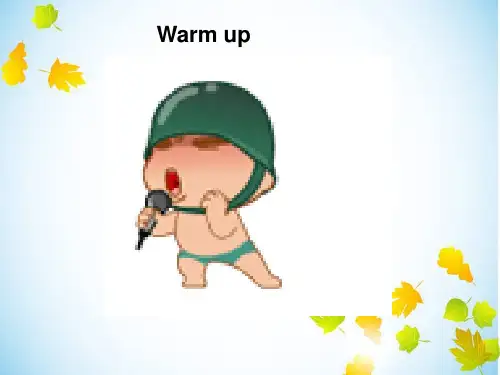新概念英语第一册第71课一般过去时
- 格式:ppt
- 大小:4.64 MB
- 文档页数:31
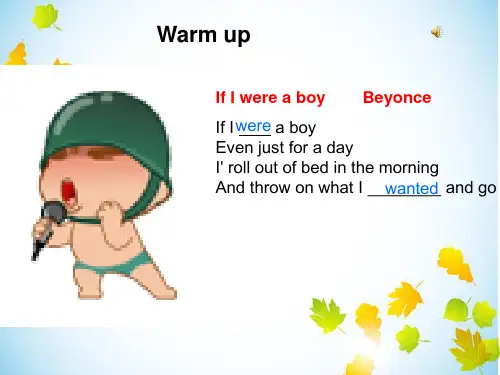
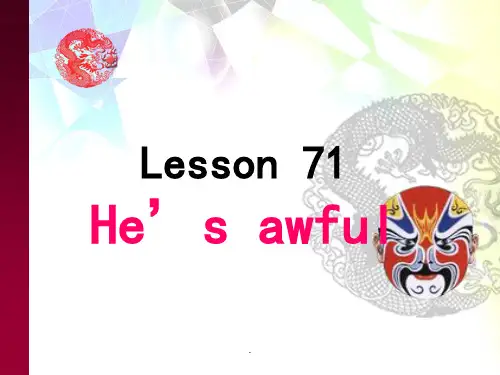

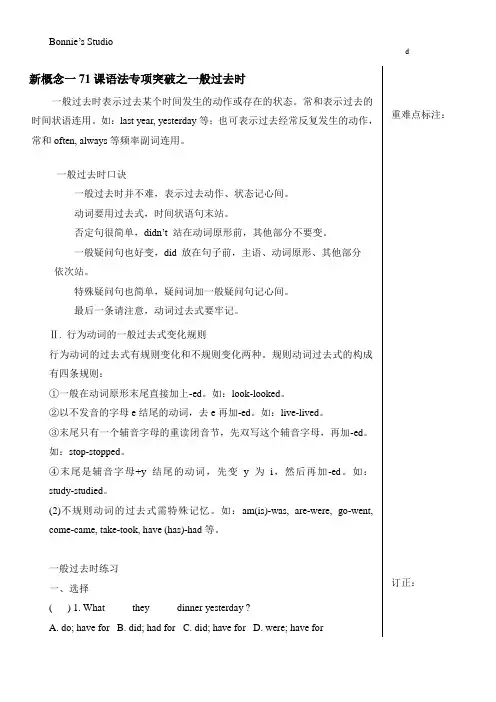
新概念一71课语法专项突破之一般过去时一般过去时表示过去某个时间发生的动作或存在的状态。
常和表示过去的时间状语连用。
如:last year, yesterday等;也可表示过去经常反复发生的动作,常和often, always等频率副词连用。
Ⅱ. 行为动词的一般过去式变化规则行为动词的过去式有规则变化和不规则变化两种。
规则动词过去式的构成有四条规则:①一般在动词原形末尾直接加上-ed。
如:look-looked。
②以不发音的字母e结尾的动词,去e再加-ed。
如:live-lived。
③末尾只有一个辅音字母的重读闭音节,先双写这个辅音字母,再加-ed。
如:stop-stopped。
④末尾是辅音字母+y结尾的动词,先变y为i,然后再加-ed。
如:study-studied。
(2)不规则动词的过去式需特殊记忆。
如:am(is)-was, are-were, go-went,come-came, take-took, have (has)-had等。
一般过去时练习一、选择( ) 1. What _____they _____dinner yesterday ?A. do; have forB. did; had forC. did; have forD. were; have for 重难点标注:订正:一般过去时口诀一般过去时并不难,表示过去动作、状态记心间。
动词要用过去式,时间状语句末站。
否定句很简单,didn’t 站在动词原形前,其他部分不要变。
一般疑问句也好变,did放在句子前,主语、动词原形、其他部分依次站。
特殊疑问句也简单,疑问词加一般疑问句记心间。
最后一条请注意,动词过去式要牢记。
at this time. ( ) 2. Could you tell me what time the plane ?A. leftB. leavesC. leavedD. was leaving( )One of us ______band last month.A. leavesB. leaveC. leavedD. left( ) 4. Where _______your mother born?A. areB. wasC. wereD. is( ) 5. Do you know why he_____for class last year?A. was always lateB. always was lateC. is late alwaysD. is always late( ) 6. I got up _____this morning, so I _____breakfast and went to school.A. late; didn’t haveB. early; didn’t haveC. late; hadn’tD. early; hadn’t( ) 7. It ______much cold today than it _____ yesterday.A. is; isB. was; wasC. is; wasD. was; is( ) 8. He didn’t come_____goodbye to us and away.A. say; goB. say; wentC. to say; wentD. to say ; go( ) 9. Her pen was broken. She____ to _____a new one.A. wants; buysB. wanted; boughtC. wants; boughtD. wanted; buy( ) 10. I thought the dress_____ really pretty.A. isB. wasC. /D. were二、用所给词的适当形式填空1.He put the books away and ________ (go) home.2. The boy is running and________ (tie) his shoes on the playground.3. My father________ (buy) a new computer for________ (I ) yesterday.4. He often ______ (go) to school by bike, but last year heoften _________ (walk) to school.5. After she finished _______ (pack) everything, she ________(go) to bed.6. ---- Who______(wash) the plates on the table ?---- Jenny did.7. ---- When _______ you_____ (see ) the film “ Titanic”?8. It’s half past eleven now. Jim_____ (have) lunch. He usually______(have) it。
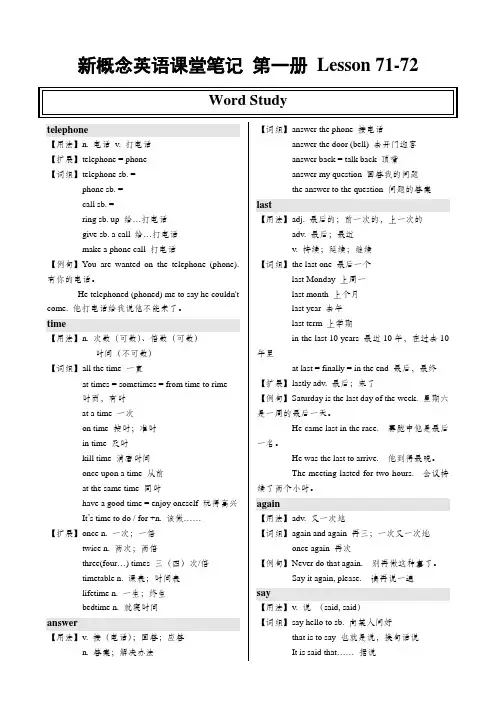
新概念英语课堂笔记第一册Lesson 71-72telephone【用法】n. 电话v. 打电话【扩展】telephone = phone【词组】telephone sb. =phone sb. =call sb. =ring sb. up 给…打电话give sb. a call 给…打电话make a phone call 打电话【例句】You are wanted on the telephone (phone). 有你的电话。
He telephoned (phoned) me to say he couldn't come. 他打电话给我说他不能来了。
time【用法】n. 次数(可数)、倍数(可数)时间(不可数)【词组】all the time 一直at times = sometimes = from time to rime时而,有时at a time 一次on time 按时;准时in time 及时kill time 消磨时间once upon a time 从前at the same time 同时have a good time = enjoy oneself 玩得高兴It’s time to do / for +n. 该做……【扩展】once n. 一次;一倍twice n. 两次;两倍three(four…) times 三(四)次/倍timetable n. 课表;时间表lifetime n. 一生;终生bedtime n. 就寝时间answer【用法】v. 接(电话);回答;应答n. 答案;解决办法【词组】answer the phone 接电话answer the door (bell) 去开门迎客answer back = talk back 顶嘴answer my question 回答我的问题the answer to the question 问题的答案last【用法】adj. 最后的;前一次的,上一次的adv. 最后;最近v. 持续;延续;继续【词组】the last one 最后一个last Monday 上周一last month 上个月last year 去年last term 上学期in the last 10 years 最近10年,在过去10年里at last = finally = in the end 最后,最终【扩展】lastly adv. 最后;末了【例句】Saturday is the last day of the week. 星期六是一周的最后一天。
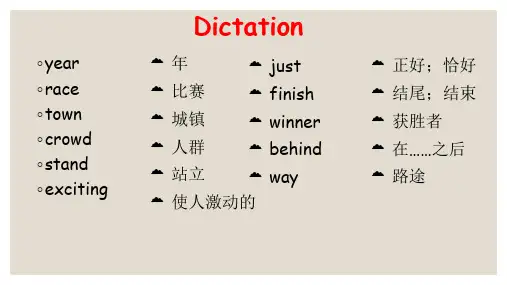
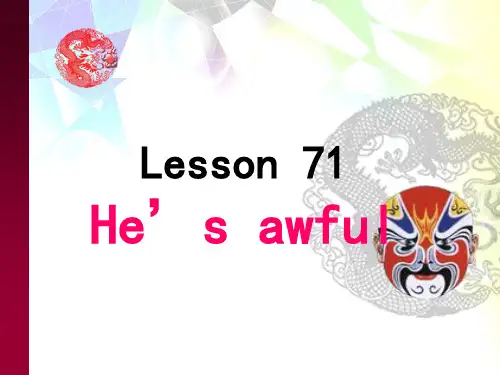
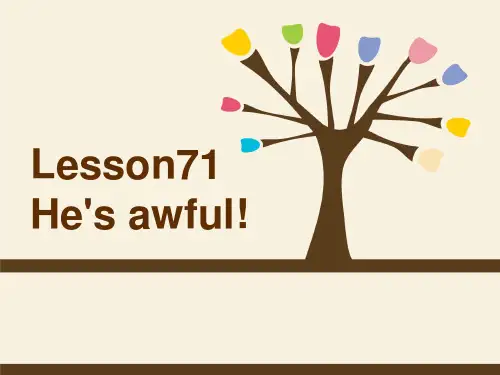
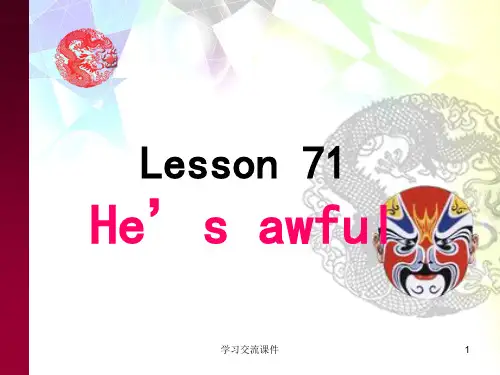
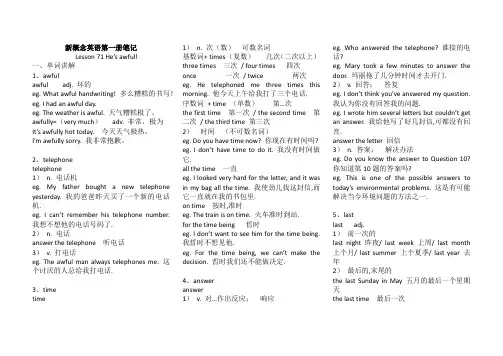
新概念英语第一册笔记Lesson 71 He’s awful!一、单词讲解1、awfulawful adj. 坏的eg.What awful handwriting! 多么糟糕的书写!eg.I had an awful day.eg.The weather is awful. 天气糟糕极了。
awfully=(very much)adv. 非常,极为It’s awfully hot today.今天天气极热。
I’m awfully sorry. 我非常抱歉。
2、telephonetelephone1)n. 电话机eg.My father bought a new telephone yesterday. 我的爸爸昨天买了一个新的电话机.eg.I can’t remember his telephone number. 我想不想他的电话号码了.2)n. 电话answer the telephone 听电话3)v. 打电话eg.The awful man always telephones me. 这个讨厌的人总给我打电话.3、timetime 1)n. 次(数)可数名词基数词+ times (复数)几次(二次以上)three times 三次/ four times 四次once 一次/ twice 两次eg.He telephoned me three times this morning.他今天上午给我打了三个电话.序数词+ time (单数)第…次the first time 第一次/ the second time 第二次/ the third time 第三次2)时间(不可数名词)eg.Do you have time now? 你现在有时间吗?eg.I don’t have time to do it. 我没有时间做它.all the time 一直eg.I looked very hard for the letter, and it wasin my bag all the time. 我使劲儿找这封信,而它一直就在我的书包里.on time 按时,准时eg.The train is on time. 火车准时到站.for the time being 晢时eg.I don’t want to see him for the time being.我晢时不想见他.eg.For the time being, we can’t make thedecision. 晢时我们还不能做决定.4、answeranswer1)v. 对…作出反应;响应eg.Who answered the telephone? 谁接的电话?eg.Mary took a few minutes to answer thedoor. 玛丽拖了几分钟时间才去开门.2)v. 回答;答复eg.I don’t think you’ve answered my question.我认为你没有回答我的问题.eg.I wrote him several letters but couldn’t getan answer. 我给他写了好几封信,可都没有回音.answer the letter 回信3)n. 答案;解决办法eg.Do you know the answer to Question 10?你知道第10题的答案吗?eg.This is one of the possible answers totoday’s environmental problems. 这是有可能解决当今环境问题的方法之一.5、lastlast adj.1)前一次的last night 昨夜/ last week 上周/ last month上个月/ last summer 上个夏季/ last year 去年2)最后的,末尾的the last Sunday in May 五月的最后一个星期天the last time 最后一次6、phonephone n. 电话7、againagain adv. 再一次,又一次eg.Say it again. 再说一次.eg.When can we meet again? 我们何时再见面?eg.Don’t do that again. 下次不可以再这样. eg.This must never happen again. 这样的事情以后不可再度发生.again and again 屡次地,再三地be oneself again (指身体或精神)恢复常态7、saysay v. (强调说话的内容)二、课文讲解What’s Ron Marston like, Pauline?What is sb like? 可用来询问某人的外貌或品行.What’s her father like? 她爸爸是怎样一个人? He’s awful! He telephoned me four times yesterday, and three times the day before yesterday. 他讨厌透了!他昨天给我打了4次电话.前天打了3次. 1)awful 讨厌的I don’t want to speak to this awful man.2)telephone 做动词,打电话telephoned过去式3)four times 4次time在英语中作不可数名词时表示“时间”,作可数名词时表示“次数”, once 一次、twice 两次, 三次或三次以上通常用基数词+ times表示4)yesterday 昨天yesterday morning 昨天上午5)the day before yesterday 前天/ the dayafter tomorrow 后天I washed all my clothes the day beforeyesterday. 我前天把所有的衣服都洗了。
